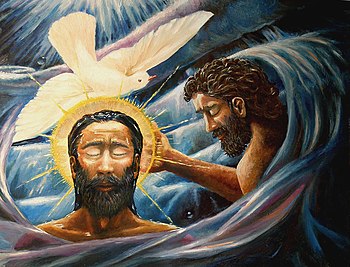Category: Home
Confession of PeterConfession of Peter
In Christianity, the Confession of Peter (anglicized from the Matthean Vulgate Latin section title: Confessio Petri) refers to an episode in the New Testament in which the Apostle Peter proclaims Jesus to be the Christ (Jewish Messiah). The proclamation is described in the three Synoptic Gospels: Matthew 16:13-20, Mark 8:27–30 and Luke 9:18–20.
The proclamation of Jesus as Christ is fundamental to Christology; the Confession of Peter and Jesus’ acceptance of the title “Messiah” form a definitive statement in the New Testament narrative regarding the person of Jesus Christ. In this New Testament narrative, Jesus not only accepts the titles Christ and Son of God, but declares the proclamation a divine revelation by stating that his Father in Heaven had revealed it to Peter, unequivocally declaring himself to be both Christ and the Son of God.
In the same passage Jesus also selects Peter as the leader of the Apostles, and states: “Upon this rock I will build my church”. Most Christian denominations agree that the statement applies to Peter, but they diverge on their interpretations of what happens after Peter.
The Confession of Peter is also the name of a liturgical feast day celebrated by several Christian churches, often as part of the Week of Prayer for Christian Unity.
The Baptism of Our LordThe Baptism of Our Lord
Today the Church celebrates the Feast of the Baptism of Our Lord. This brings to an end the season of Christmas. The Church recalls Our Lord’s second manifestation or epiphany which occurred on the occasion of His baptism in the Jordan. In the Eastern Church this feast is called Theophany because at the baptism of Christ in the River Jordan God appeared in three persons. Many of the incidents which accompanied Christ’s baptism are symbolical of what happened at our Baptism. At Christ’s baptism the Holy Spirit descended upon Him; at our Baptism the Trinity took its abode in our soul. At His baptism Christ was proclaimed the “Beloved Son” of the Father; at our Baptism we become the adopted sons of God. At Christ’s baptism the heavens were opened; at our Baptism heaven was opened to us. At His baptism Jesus prayed; after our Baptism we must pray to avoid actual sin.
EpiphanyEpiphany

Epiphany, also Theophany or Three Kings Day is a Christian feast day that celebrates the revelation of God in his Son as the incarnation of Jesus Christ. In Western Christianity, the feast commemorates principally (but not solely) the visit of the Magi to the Christ child, and thus Jesus’ physical manifestation to the Gentiles. Moreover, the feast of the Epiphany, in some Western Christian denominations, also initiates the liturgical season of Epiphanytide. Eastern Christians, on the other hand, commemorate the baptism of Jesus in the Jordan River, seen as his manifestation to the world as the Son of God.
The traditional date for the feast is January 6. However, since 1970, the celebration is held in some countries on the Sunday after January 1. Eastern Churches following the Julian calendar observe the feast on what for most countries is January 19 because of the 13-day difference today between that calendar and the generally used Gregorian calendar. In many Western Christian Churches, the eve of the feast is celebrated as Twelfth Night. The Monday after Epiphany is known as Plough Monday.
Popular Epiphany customs include Epiphany singing, chalking the door, having one’s house blessed, consuming Three Kings Cake, winter swimming, as well as attending church services. It is customary for Christians in many localities to remove their Christmas decorations on Epiphany Eve (Twelfth Night), although those in other Christian countries historically remove them on Candlemas, the conclusion of Epiphanytide. According to the first tradition, those who fail to remember to remove their Christmas decorations on Epiphany Eve must leave them untouched until Candlemas, the second opportunity to remove them; failure to observe this custom is considered inauspicious.

